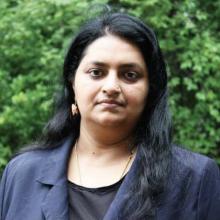The Case Comprehensive Cancer Center (Case CCC) has made pilot award selections following a recent RFA. Selected projects were recognized as highly innovative and impactful, and likely to generate key data for larger, nationally competitive grants. Investigators were permitted to submit transformative proposals for technology development, biological or therapeutic questions, novel concepts in catchment-based research, or topics with the potential to overturn dogma. Each project will be granted $50,000 in seed funding.
Developing BAFF-R CAR-T cells to target malignant B cells
Reshmi Parameswaran, MS, PhD was chosen to receive pilot funding for "Developing BAFF-R CAR-T cells to target malignant B cells." Parameswaran is assistant professor of pathology, pediatrics and medicine at Case Western Reserve University (CWRU). She is joined by three co-investigators from University Hospitals. Clinical pathologist Rose Beck, MD, PhD is clinical assistant professor of pathology in the School of Medicine at CWRU and director of the Hematopathology Fellowship Program. Hematologist-oncologist Paolo Caimi, MD is medical director, clinical trials at University Hospitals Seidman Cancer Center and associate professor of medicine, hematology and oncology at CWRU's School of Medicine while hematologist-oncologist Eshan Malek, MD is assistant professor of medicine at CWRU. All are members of the Case CCC Hematopoietic and Immune Cancer Biology Program.
The project aims to develop novel B-cell activating factor receptor (BAFF-R) chimeric antigen receptor (CAR-T) cells, complete in vitro testing of BAFF-R.CAR-T cells for its acute lymphoblastic leukemia (ALL) cytotoxic activity, and complete in vivo testing using PDX-ALL models. The team sees BAFF-R as an attractive therapeutic target for specific killing of ALL cells in the bone marrow microenvironment without affecting any other normal cells among other potential therapies.
New Paradigm: Protein tyrosine nitration in tumorigenesis
Zhenghe John Wang, PhD's proposal "New Paradigm: Protein tyrosine nitration in tumorigenesis" was also chosen from submissions for pilot funding. Wang is professor and vice chair for faculty development in the department of genetics and genome sciences in CWRU's school of medicine. He is also co-leader of the GI Cancer Genetics Program at the Case CCC.
His research proposes to identify potential proteins binding specifically to nitrated paxillin Y404 or Y409 and determine the functional significance of nitrated paxillin. Through these discoveries, Dr. Wang predicts a new model that protein tyrosine nitration is regulated by enzymes and transduces signaling that plays a critical role in physiological and pathologic processes. He expects to shed a new light on tumorigenesis which may provide novel cancer therapeutic targets. Furthermore, the studies may have broad impact on various human diseases including Alzheimer's, Parkinson's, atherosclerosis, diabetes, myocardial infarction and chronic obstructive pulmonary disease as protein tyrosine nitration is also abnormally up-regulated in these conditions.
Targeting cross-talk between domains in estrogen receptor
Sichun Yang, PhD and Hung-Ying Kao, PhD were selected to investigate "Targeting cross-talk between domains in estrogen receptor." Yang is associate professor of nutrition and Kao is professor of biochemistry in the School of Medicine at CWRU. Both are members of the Case CCC Molecular Oncology Program.
Their research intends to determine the interface-targeting specificity of repurposed FDA drugs and derivatives as well as establish the molecular features of ligand-interface binding. Doctors Yang and Kao believe that identifying the functional and molecular basis of the interfacial targeting and the effect on existing ER-targeted therapies will give rise to improved therapeutics alongside a functional understanding of hormone resistance





